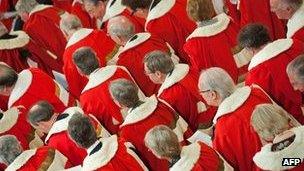No referendum to be held on House of Lords reform
- Published

The coalition has proposed making the House of Lords a mostly elected body
The government has decided not to hold a national referendum on plans to reform the House of Lords.
The coalition has suggested cutting the number of peers from more than 800 to 300, with 240 elected and 60 appointed.
It will publish its plans next week. If its legislation is passed, the first elections would take place in 2015.
David Cameron had hinted he might agree to a referendum on the changes but Nick Clegg, who made reform a major Lib Dem issue, had said it was not necessary.
The three main national parties backed the proposed changes at the last general election but some MPs and peers argue that constitutional change should not be a priority at a time of economic crisis.
There are also concerns that altering the Lords could undermine the primacy of the Commons.
Key concessions
BBC political correspondent Robin Brant said some Conservatives would see the decision not to hold a referendum as a victory for deputy prime minister Nick Clegg on a key issue for his Liberal Democrats.
But our correspondent said government sources had indicated that the prime minister had secured several key concessions.
These included making it clear that the new-look Lords could not block legislation passed by the House of Commons, he said.
The sources also said the predicted cost of a referendum - believed to be about £100m - was unacceptable for an issue that was backed by the three main national parties.
Labour Leader Ed Miliband has insisted that a referendum is necessary to approve the proposals.
- Published22 June 2012
- Published19 June 2012
- Published18 June 2012
- Published9 May 2012